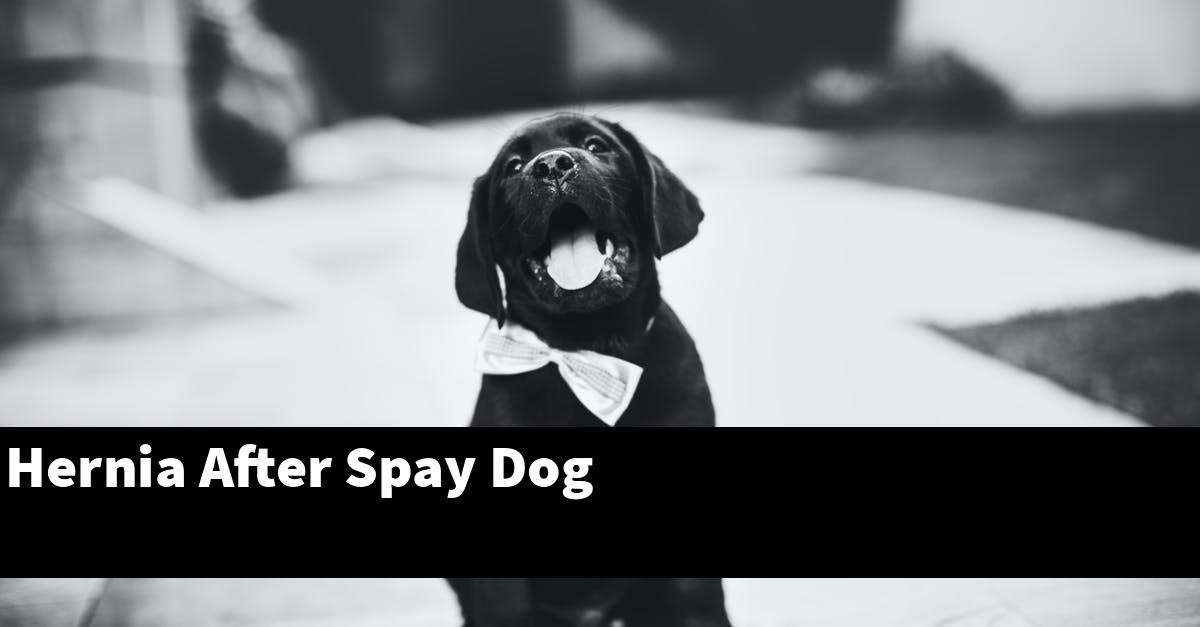Hernias are relatively common in dogs and can occur after any type of surgery. A hernia is a protrusion of an organ or tissue through a weakened area in the surrounding structure. Hernias can be either congenital (present at birth) or acquired (develops later in life).
The article is going to be discussing the causes, symptoms, and treatment options for a hernia after a dog has been spayed.
Table of Contents
How common is it for dogs to develop a hernia after being spayed?
A hernia is a protrusion of an organ or tissue through the wall of the cavity that normally contains it. Hernias can occur anywhere in the body, but are most common in the abdomen. In dogs, the most common type of hernia is an inguinal hernia, which occurs when a part of the intestine protrudes through the inguinal canal.
Spaying is a surgical procedure in which the ovaries and uterus are removed from a female dog. It is a common procedure that is typically performed when a dog is between six and nine months old.
Inguinal hernias are relatively common in dogs that have been spayed. The exact incidence is unknown, but it is estimated that up to 10% of all female dogs that are spayed will develop an inguinal hernia. The hernia may be present at the time of the surgery, or it may develop later.
The vast majority of inguinal hernias in dogs are not serious and do not require treatment. However, in some cases, the hernia may become incarcerated, meaning that the intestine becomes trapped in the hernia and cannot be pushed back into the abdomen. This can be a serious problem and requires immediate veterinary treatment.
What are the risk factors for a hernia developing after a spay surgery?
There are a few risk factors associated with developing a hernia after a spay surgery. One is if the incision is made too close to the navel. This puts unnecessary tension on the wound and can cause the formation of a hernia. Another risk factor is if the animal is overweight or obese. This can cause the abdominal muscles to separate, which can lead to a hernia. Lastly, if the animal has a history of hernias, they are more likely to develop another one after a spay surgery.
How can you tell if your dog has a hernia?
A hernia occurs when an organ or tissue protrudes through an abnormal opening in the body. In dogs, hernias most commonly occur in the abdomen and can be either internal or external. An internal hernia occurs when an organ protrudes through a tear in the abdominal wall, while an external hernia occurs when the abdominal contents protrude through a natural opening in the body, such as the navel.
There are several signs that may indicate that your dog has a hernia, including:
-A bulge in the abdominal area
-Swelling or tenderness in the abdominal area
-Lethargy
-Loss of appetite
-Vomiting
If you notice any of these signs, it is important to take your dog to the vet for an examination. Hernias can be painful and can cause serious health problems if they are not treated.
What are the treatment options for a hernia after a spay surgery?
There are a few different options for treating a hernia after a spay surgery. The first option is to simply allow the hernia to heal on its own. This is often the best option for small hernias. The second option is to repair the hernia surgically. This is often the best option for larger hernias. The third option is to place a stent in the hernia. This is often the best option for very large hernias.
How do I know if my dog has a hernia after being spayed?
Hernias in dogs can occur after being spayed due to the incision made during the surgery. The hernia may be a small bulge under the skin or a more serious internal abdominal hernia. Symptoms of a hernia may include:
-Swelling or bulge at the surgical site
-Lethargy
-Loss of appetite
-Vomiting
-Abdominal pain
If you notice any of these symptoms, it’s important to take your dog to the vet for an examination. The vet will be able to confirm whether or not your dog has a hernia and discuss treatment options.
Is a belly lump normal after dog spay?
A lump on the belly is not necessarily abnormal after a dog has been spayed. It is not uncommon for there to be some swelling and bruising around the incision site. If the lump is hard and does not seem to be getting any smaller, it is best to have your veterinarian check it out to make sure it is not an abscess.
Why is there a bump where my dog was spayed?
If you have a female dog that has been spayed, you may have noticed a small bump on her lower abdomen. This is normal and is nothing to worry about. The bump is caused by the surgical incision that was made during the spaying procedure.
As the incision heals, the tissue around it will start to form a small lump. This is completely normal and is nothing to be concerned about. The lump will eventually go away on its own. In the meantime, you can help to speed up the healing process by keeping the area clean and dry.
Can a spay hernia heal on its own?
A hernia is when an organ protrudes through the muscle or tissue that is holding it in place. A spay hernia is when the organ is the ovary and the protrusion is through the abdominal wall.
The answer to whether or not a spay hernia can heal on its own is unfortunately, no. Hernias in general do not heal on their own and require surgery to fix the problem. The reason for this is that the muscle or tissue that is holding the organ in place is usually weak or damaged. This can be from a congenital defect, an injury, or even just from the strain of everyday life.
When the muscle or tissue is weak, the organ can push through it and create a bulge. This bulge can then get larger and larger over time, which is why hernias generally get worse over time and do not heal on their own.
If you think you may have a hernia, it is important to see a doctor right away. They will be able to tell you for sure and can refer you to a surgeon if necessary. Hernias can often be fixed with surgery, so it is important to get it checked out as soon as possible.
Summary
:
Hernias cannot heal on their own and require surgery to fix the problem. If you think you may have a hernia, it is important to see a doctor right away.


